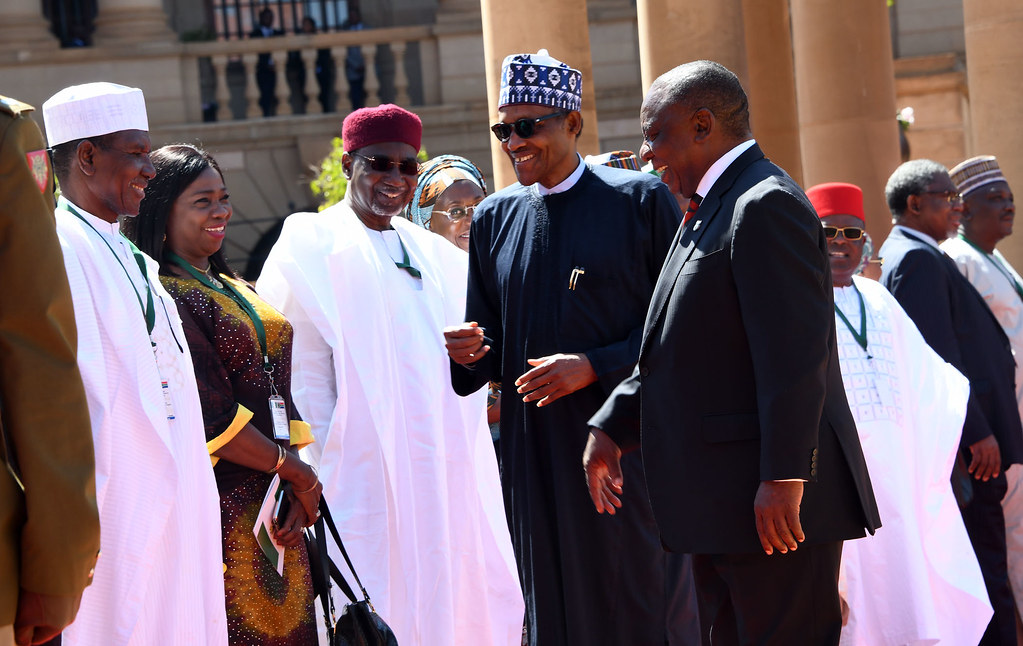
Until Muhammadu Buhari won presidential elections in Nigeria in 2015, the general consensus was that the most powerful and visible representative of the state was the president. Buhari, of course, spent months at a time outside the country (on medical leave in the UK) and has very rarely been seen in public. Most recently he has been criticized for his invisibility during the COVID-19 pandemic. As a result, the idea developed that power resided with his senior staff, especially Abba Kyari, Buhari’s Chief of Staff between August 2015 and this April, when he died of COVID-19.
There is no doubt that Kyari wielded great power and influence while he was alive, as a result of his position and his long term relationship with the President; they were close friends and knew each other since 1976. But the fact remains that governance conducted by the administration he was a member of was influenced mainly by external factors out of the control of any single individual, even the President.
The idea that governance was hijacked by Kyari and/or a cabal within the presidency, has acted as a convenient foil to evade the current realities facing the presidency. The reality is that the office is not the all-powerful force that outsiders may think. Claims of a government being in the control of renegade forces are hardly new to Nigerian politics, but there are slight differences between those narratives and those around Kyari’s legacy. The main difference is that allegations of previous cabals have consisted of shadowy individuals without a clearly identified figurehead. Kyari had been identified by sections of the Nigerian press as a puppet master who functioned without the President’s approval and sought to govern on his own ideals, contrary to that of his principal. Much of this reporting is off base, including comments by First Lady Aisha Buhari (Buhari came out personally to refute these), and a leaked letter from the National Security Adviser. In reality, there is little evidence to support these claims, as reporting on the many deeds of Kyari are based on unsubstantiated gossip with a paucity of facts. This does not downplay the influence of the Chief of Staff on day to day governance and politicking, rather it situates the Buhari administration alongside its predecessors as those that exist within the ebbs and flows of a global economy that it has been unable to fully integrate with.
Parallels between the government’s current policies and those pursued by Buhari during his stint as a military ruler between 1983 to 1985 abound. Some of these are: his reticence to devalue Nigeria’s currency, the naira; his aversion to the International Monetary Fund; and his pursuance of protectionist policies to revive the country’s agricultural sector. What’s often ignored are some of Buhari’s policy deviations such as his support and endorsement of efforts at improving the ease of business in Nigeria and the eventual decision to devalue the naira (despite the President’s prior insistence on maintaining the currency peg to protect the masses). Both of those being reform positions that have been requested by neoliberal institutions that the president has often been wary of. Critics might argue that these positions are as a result of the influence of advisers or evidence of control by a “cabal.” The fact remains that these policy actions were/are more reactionary to external crises such as: the fall in oil price crisis and the recession it precipitated which made urgent the need to diversify the economy away from oil, OPEC oil production cuts and the Saudi-Russia oil price war and most recently the COVID-19 pandemic.
President Buhari in a speech at Chatham House in 2015, during his campaign for the presidency, stated that much of his thinking changed with the collapse of the Berlin Wall in 1989 and the dissolution of the USSR in 1991. It is not far-fetched to believe that one of the noticeable influences on Buhari’s economic thinking was Kyari, who also happened to have served as his economic adviser. However, Kyari’s influence on the economic agenda was at best minimal, at worst an attempt to enact policies by his favorite economic thinkers that are neither novel nor have been successfully implemented.
Kyari cites some of his favorite economic thinkers as Arthur Lewis, Amartya Sen and Vijay Joshi, all economists of color, with at least one having practical experience in working within a government role to contribute towards the economic development of a developing country. Their ideas of: remedying economic and social inequality (Sen), provision of universal healthcare services (Sen), inflation targeting (Joshi), liberalizing reforms (Joshi) and labor transition between the public and private sector (Lewis), are neither new to Nigerian policy makers nor radical departures from policies successive governments have sought to implement.

Comments
Post a Comment
Let know your comments